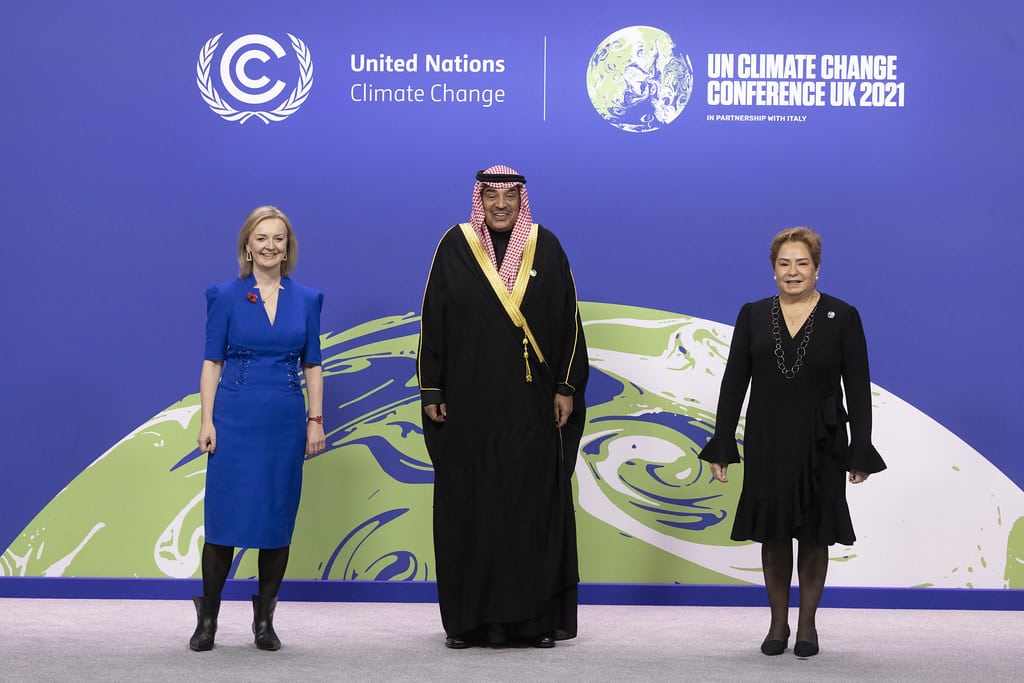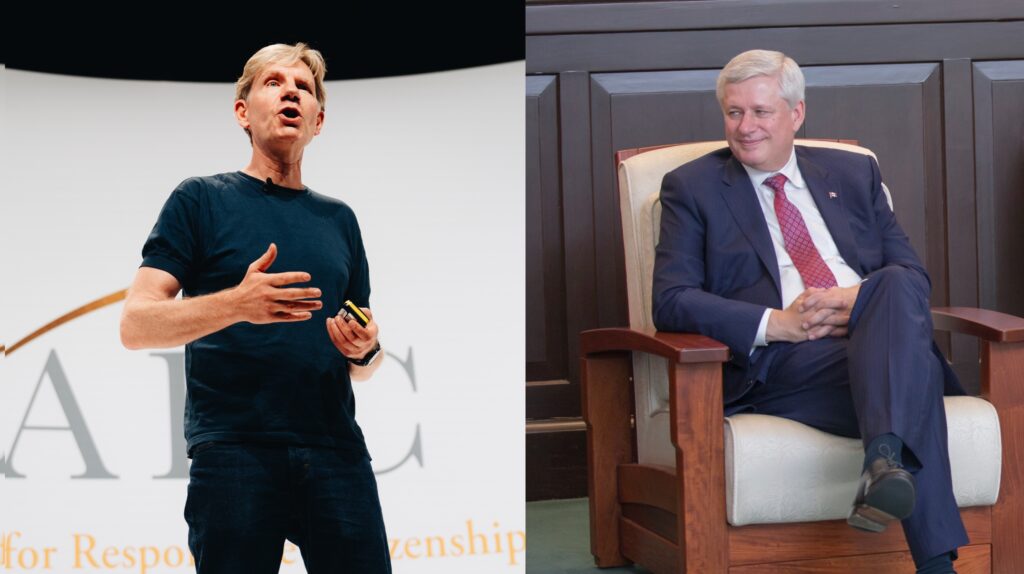Several top oil-producing countries stacked their delegations to the COP26 climate summit in Glasgow with oil and gas industry executives and officials from their oil ministries. In some cases, oil personnel represented significant portions of their overall country delegation, according to a DeSmog analysis.
The UK organizers of the COP26 climate conference very publicly declined to offer international oil companies any slots in the conference or any formal role in the event, and oil companies without credible climate programs were also barred from sponsoring events at the high-stakes international talks currently underway.
But that has not stopped the oil majors and state oil companies from showing up under the guise of business and trade groups or national delegations. The official participant list is full of executives and employees from the largest publicly traded oil companies in the world, including Royal Dutch Shell and BP.
Gulf States Top Countries Sending Oil Officials
Among the national delegations, oil producers in the Middle East stood out, with Saudi Arabia sending more than two dozen people that either worked directly for state-owned oil company Saudi Aramco, or had formerly worked for the company. That amounted to roughly 45 percent of the entire Saudi delegation.
Other Gulf States had similar patterns. More than a quarter of Kuwait’s 64-member delegation came either from the Ministry of Oil, or state-owned firms like the Kuwait Oil Company, the Kuwait Oil Tanker Company, or Kuwait Petroleum International.
The United Arab Emirates (UAE) sent at least 20 officials from its Department of Energy, the state-owned oil company ADNOC, or the publicly listed oil company TAQA.
“Fossil fuels are everywhere at this COP except in the decisions being negotiated by governments,” Nikki Reisch, the director of climate and energy at the Center for International Environmental Law, wrote to DeSmog from Glasgow. “Simultaneously, there are unprecedented restrictions on civil society access to the talks, which only exacerbate the gross imbalance of power between people and polluters, and threaten to undermine the legitimacy of COP26 outcomes.”
In some cases, the affiliation with the oil industry was publicly declared on the participant list for COP26. For example, Mohammad Haider from Kuwait is declared as an employee with Kuwait Oil Company.
In other instances, their connections are less clear. For example, Hamoud R. AlOtaibi is registered as a senior consultant on climate change for Saudi Arabia’s Ministry of Energy. But, according to his LinkedIn page, he works as an advisor for Saudi Aramco. Others are listed with even less detail. Mohammed A. Alakil is simply attending under the Saudi Energy Ministry, with no other biographical information. But his LinkedIn page says he works for SABIC, the Saudi petrochemical company, which is owned by Aramco.
The Saudi delegation is replete with many more former employees of Aramco. Khalid M. Abuleif is Saudi Arabia’s chief negotiator at COP26, a position he has held since 2012. But he got his start working at Aramco in the 1990s.
I welcome Saudi Arabia’s 🇸🇦 announcement that it will reach net zero by 2060
— Alok Sharma (@AlokSharma_RDG) October 23, 2021
I hope this landmark announcement at #SGIForum will galvanise ambition from others ahead of #COP26
Look forward to the detail of Saudi Arabia’s revised NDC and working together to keep 1.5C in reach
The oil-heavy delegations raise questions about the government’s intentions in Glasgow. To be sure, Saudi Arabia’s plans to increase oil production are well-known, and its climate plan relies heavily on speculative carbon capture technologies at some distant date in the future. Saudi Arabia recently announced a goal of reaching net-zero emissions by 2060, but offered little more detail on how it will get there.
But the public commitment to oil production is reinforced by behind the scenes lobbying. BBC News reported last month that Saudi Arabia, Japan, and Australia were among a group of countries that are seeking to water down a key scientific report to be published by the Intergovernmental Panel on Climate Change (IPCC). Leaked documents show that an adviser to the Saudi oil ministry demanded that “phrases like ‘the need for urgent and accelerated mitigation actions at all scales’ should be eliminated from the report.”
Other countries also sent fossil fuel influenced delegations, including the UAE, Iraq, Kazakhstan, and Russia.
One surprising finding in DeSmog’s analysis came in the delegation from Colombia, which sent nearly two dozen officials from its Mines and Energy Ministry, as well as National Hydrocarbons Agency and even from the country’s top oil company. Felipe Bayón, the CEO of Ecopetrol, the largest oil company in Colombia and the fourth largest in South America, traveled with the official delegation. Several other employees, former employees, and board members of Ecopetrol also went to Glasgow under Colombia’s banner.
President of Colombia: "Important to be carbon neutral AND nature positive, this must be in hearts and minds of ALL people" Big news: Colombia is "not waiting to 2030 to protect its forest" – working to a 2022 goal #GlasgowLeadersForestDeclaration @COP26 #naturebasedsolutions pic.twitter.com/oDUAwA7MkK
— Prof Nathalie Seddon @COP26 (@NathalieSeddon) November 2, 2021
The delegations from Saudi Arabia, Iraq, Colombia, Kuwait, and the UAE did not respond to requests for comment.
“For evidence that the fossil fuel industry is influencing the talks, look no farther than the glaring absence of any references to fossil fuels in the decision text to date,” Reisch said. “The ongoing failure of countries to say the ‘F-word’ — to name oil, gas, and coal as the primary drivers of global warming and to commit to immediately halting new fossil fuel production and phasing out fossil fuels — is inexcusable. It’s a reflection of the stranglehold that polluters have on policymakers, and the unwillingness of governments to put people over profit.”
Oil Majors Show up in Disguise
The presence of oil interests does not stop at the employees and executives from national oil companies and government ministries. Despite the fact that the COP26 organizers banned oil companies from sending their own delegations, prominent publicly traded oil majors have found other ways to attend the climate negotiations as well.
According to DeSmog’s tally, at least three dozen oil executives gained access to the talks thanks to business and trade associations — and those are only the ones who publicly listed their oil company affiliations.
For instance, Royal Dutch Shell sent at least six employees under multiple designations. Steven Schofield, the head of Shell’s climate policy, and Susan Shannon, VP of policy and advocacy, traveled to Glasgow as part of a delegation sent by the International Chamber of Commerce.
Shell boss Ben van Beurden on COP26 – "we were told we were not welcome so we will not be there".
— Emily Gosden (@emilygosden) October 28, 2021
Syrie Crouch, VP of carbon capture and storage at Shell, went to Glasgow as part of BusinessEurope, a Brussels-based lobbying outfit for large European business interests.
David Bunch, VP of Retail Sales and Operations, attended the conference as part of the UK Emissions Trading Group. David Hone, the chief climate change advisor for Shell, attended COP26 under the auspices of the International Emissions Trading Association (IETA).
In fact, IETA sent at least 15 oil executives to Glasgow, including Occidental Petroleum CEO Vicki Hollub, and other executives from BP, Chevron, TotalEnergies, mining giant Rio Tinto, privately held oil traders Mercuria and Trafigura, and Canadian tar sands company Suncor.
“It’s outrageous for Big Oil to be given such a loud voice at these talks, when so many Pacific Islands nations on the frontlines of the climate crisis are unable to attend,” Greenpeace Australia Pacific board member and Fijian international human rights lawyer Kavita Naidu said in a statement to DeSmog. “If world leaders are serious about limiting global temperature rise to 1.5C, they should not allow the big polluters to set the agenda here.”
BP also had a large presence, with business advisor Ross O’Brien traveling under the banner of the Institution of Mechanical Engineers. Giulia Chierchia, BP’s executive VP on strategy and sustainability, went with the World Business Council for Sustainable Development. And Celso Fiori, BP’s head of communications and advocacy went with the International Chamber of Commerce.
BP and Shell did not respond to requests for comment.
Other oil companies that attended under various business groups and trade associations include Norwegian oil company Equinor and Italian oil company Eni. Several multinational mining companies also sent officials with the delegations of several trade associations.
The Largest Delegation?
DeSmog’s analysis of the COP26 participant list was not comprehensive. In fact, a separate analysis conducted by Corporate Accountability, Corporate Europe Observatory (CEO), Glasgow Calls Out Polluters, and Global Witness, documented at least 503 fossil fuel lobbyists attending the COP26 summit, coming from over 100 fossil fuel companies and 30 industry trade associations.
🔴BREAKING
— Global Witness (@Global_Witness) November 8, 2021
If the #FossilFuel industry were a country, it would have by far the largest number of delegates at #COP26
A real problem for a vital conference that has left way too many voices out – and supposed to be focused on urgent #ClimateActionhttps://t.co/wlEH8n5EBE pic.twitter.com/cH88PTneqj
“COP26 is being sold as the place to raise ambition, but it’s crawling with fossil fuel lobbyists whose only ambition is to stay in business,” Pascoe Sabido, researcher and campaigner for Corporate Europe Observatory, said in a statement.
The watchdog groups said that if those fossil fuel industry attendees were their own delegation, it would be the climate summit’s largest, bigger even than the combined delegations of countries and territories worst affected by climate change, including Puerto Rico, Myanmar, Haiti, Philippines, Mozambique, Bahamas, Bangladesh, and Pakistan.
Subscribe to our newsletter
Stay up to date with DeSmog news and alerts







